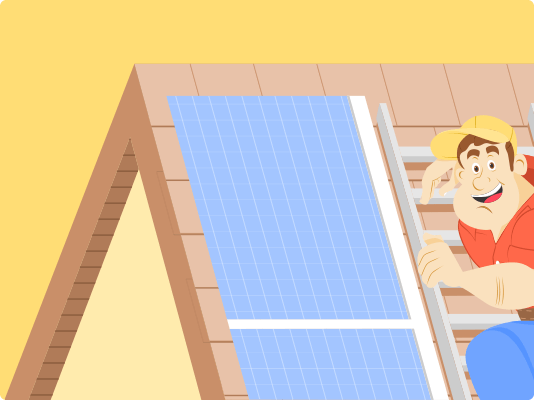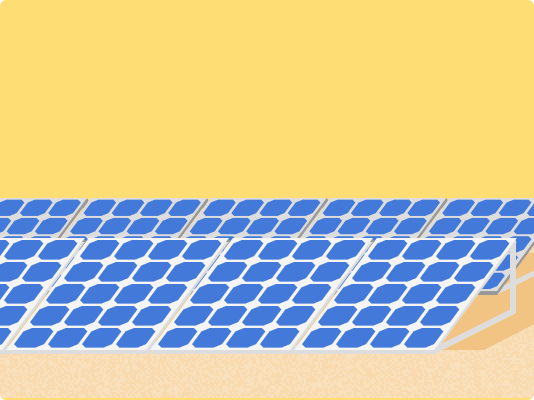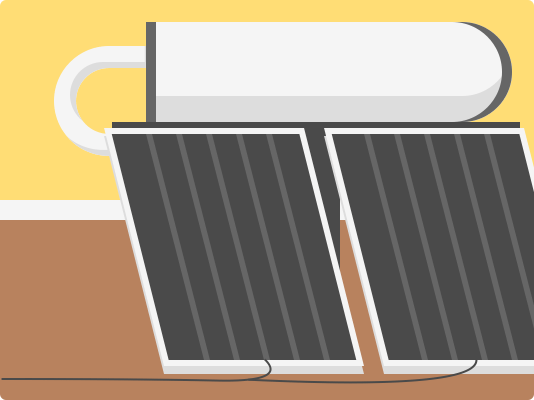
Solar Panels
(22,075 projects)
There are many reasons why so many homeowners are switching to solar energy to power their homes:
There are two main ways to get your own solar energy system - purchase it yourself or lease it through a company. There are pros and cons to both methods (https://www.energysage.com/solar/financing/should-you-buy-or-lease-your-solar-panel-system/).

So how big of a price difference is it to buy solar panels versus leasing them? When it comes to purchasing solar panels, you first have to determine how many kilowatts you'll need. If you only want to partially power your home with solar energy, you'll most likely need 1 kW or 2 kW, especially if your home is already energy-efficient. A 1 kW system will cost around $10,000 to $15,000. A 2 kW system will cost about $16,000 to $20,000. However, if you want your entire home to run on solar energy (and your home isn't completely energy-efficient), you'll most likely need a 5 kW system, which can cost up to $45,000 or more (http://home.costhelper.com/solar-panels.html).
However, depending on where you live, you may qualify for federal tax credits - up to 30% of the cost of the panels (https://www.energysage.com/solar/cost-benefit/solar-investment-tax-credit/) - or state tax credits that can help lower the cost of solar panel installation (https://turbotax.intuit.com/tax-tools/tax-tips/Tax-Deductions-and-Credits/Federal-Tax-Credit-for-Solar-Energy-/INF14243.html).
Leasing, on the other hand, generally has little or no money down, but does have a monthly bill, usually of $70-$100. You are not eligible for any tax credits if you lease your system.
In most cases, purchasing your solar panels with cash or even getting a loan is the best option if you wish to maximize the financial benefits and increase the value of your home. If you only want to cut down on some energy costs and don't plan on selling your home anytime soon, leasing could work for you.
Since solar panels last 25-30 years, it's a good idea to install them on a new roof so you won't have to worry about trying to get your roof repaired with solar panels attached to it. Replacing your roof can also be expensive, with an average cost of $6,000.
Back to top
While solar panels require little maintenance and last for up to 30 years, they can get damaged by severe weather such as hail, strong wind, and tornadoes. You may also run into small maintenance issues like needing a new converter or a new battery. The cost to repair solar panels can range from $100 to $2,500 or more depending on the severity of the damage. Most homeowners tend to spend an average of $500-$600 for repairs.
Back to top
Solar panels aren't only for generating electricity - they can also be used to heat your home or even your swimming pool! Having a solar-powered pool heater costs $2,500 to $7,000 with an average cost of $3,500. Keep in mind that the solar heater will pay itself off within a few years from the money you save on your swimming pool's heating bill.
As for water heaters, those can also be solar powered. Having a solar-powered water heater installed ranges from $1,000 to $3,500 and can generally be used in any type of climate since there are two types of solar-powered water heaters to choose from - direct circulation systems which are great for climates that rarely freeze and indirect circulation systems which are great for climates that experience freezing temperatures (https://energy.gov/energysaver/solar-water-heaters).
If you want to heat your entire home using solar power, expect to pay a bit more - around $25,000 to $100,000. This could be a great option if you live in a climate that gets a lot of sun but it generally cold since it provides up to 80% of the heat your home needs.
Back to topIf you're planning on buying your solar panel system, you'll be happy to know that there are federal and state tax credits and incentive programs available to help lower the cost of your system. The biggest is the Federal Investment Tax Credit (ITC) which is a 30% tax credit that is available to both residential and commercial systems (https://energy.gov/savings/residential-renewable-energy-tax-credit). The ITC applies to the three major types of solar energy systems (http://www.seia.org/about/solar-energy/solar-faq/what-rebates-incentives-are-available-solar-energy):
Depending on which state you live in, you could also qualify for a state incentive program. State incentive programs vary greatly (http://www.dsireusa.org/), but they all help make your solar panel system more affordable.
Back to top
Enter service and
zip code to view
cost breakdown